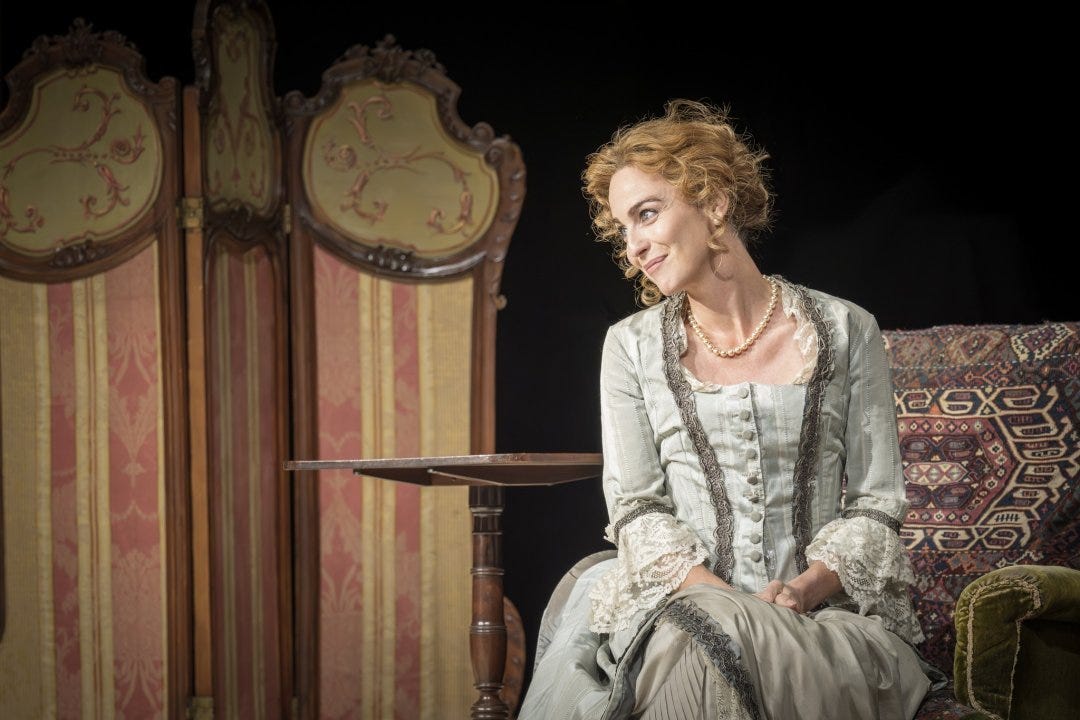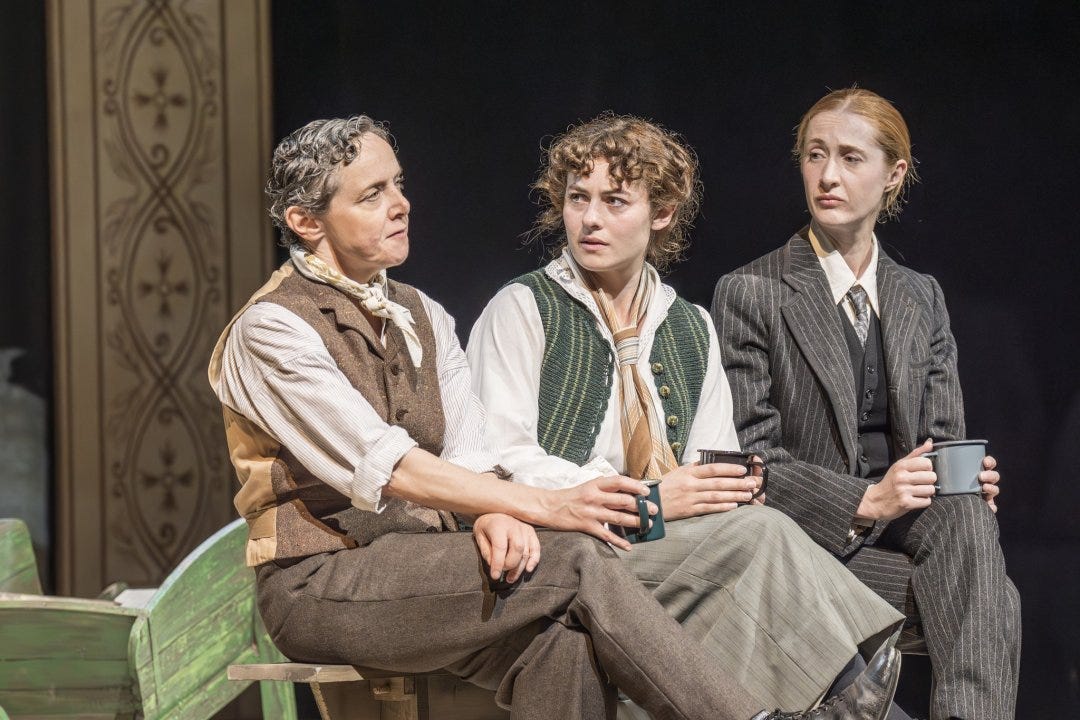Serving Irving
On Friday I saw David Hare's new play, Grace Pervades, starring Ralph Fiennes and Miranda Raison.
Earlier, taking refuge in the shade and a drink before curtain, a rolodex of memorable performances ran in my head. Flashes of movies. People alive to us because of him, though they are always, uniquely, tangibly someone else.
Now Ralph Fiennes is stood ten feet away, on stage. I feel myself become tense.
Except it isn’t Ralph Fiennes. It never is. He never is and never could be the famous face in a different costume. What he is is the violent gangster of In Bruges, the quiet archeologist from The Dig, the consummate maître d’ in The Grand Budapest Hotel, the sociopathic commandant of Schindler’s List. Or Voldemort, which we agree as we take our seats must have been a ball. Or a stiff-upper-lip, high-ranking soldier during WW1, important enough to sit in a huge and empty and daunting office of his own on Whitehall, a cameo in Nanny McPhee, an emotionally constipated father of young children for whom there is always something of much higher stakes that must be dealt with first. Maybe it’s because we watched it as young parents. Maybe Fiennes’ performance had no business being so moving.
Right now, the person on stage who isn’t Ralph Fiennes is dressed as a Catholic cardinal, though this is not a reprise of Conclave. Fiennes’ role this time is another actor, one who played a different cardinal role. The actor is Sir Henry Irving, denizen of the late Victorian era, the first actor ever to be knighted and a founding father of modern theatre. The part is Wolsey in Henry VIII.
That rolodex was prescient: famous parts keep cropping up on stage. As well as flashes of Fiennes as Irving as Wolsey, we also get flashes of Fiennes as Irving as Hamlet, as Macbeth, as Shylock, and as Irving’s many off-stage incarnations: actor, director, proprietor (of the Lyceum), advocate (for theatre as the highest art form).
David Hare’s new play is about Irving, though it is more accurate to say it is, ostensibly at least, about Irving’s relationship with the actress Ellen Terry, and more fundamentally about the competing ideas of theatre held by those involved in it. What constitutes theatre? is a question Grace Pervades asks. Where does it really end? might be another. And finally: is it more fulfilling to serve others or follow one’s artistic instincts?
“Grace pervades the hussy” is the epigraph to the play that provides its title. It is lifted from a review of one of Ellen Terry’s performances. Terry was Irving’s leading lady, reputedly his lover and certainly England’s favourite actress for the last twenty years of the nineteenth century.
She was Ophelia to his Hamlet, Portia to his Shylock. When John Singer Sargent saw her perform as Lady Macbeth he began a painting of her the very next day. It still hangs in the Tate. She was called “hussy” because her two children were illegitimate and she lived with Irving while he was still married. (Irving left his wife on principle, stepping from the horse-drawn carriage when she asked when he would be done with all this acting nonsense. He never saw her again.) We see a waiter thrilled to serve Terry in the Cafe Royal, bringing her more than she could ever eat, on the house.
The waiter doesn’t register Irving.
The play is not a love story, though. I’m not sure it’s even a love letter. Theatre has everyone in its grip, but no one seems nurtured or made happy by it. Instead it is a compulsion. A world one is born to or can’t shake. It is the medium through which the play’s characters must tell their own story, to themselves as much as to anyone.
Irving’s greatest desire is for theatre to be respectable. He wants patrons and society to see it as he does: the noblest of the arts. For Irving, intention is all. We see his modernity here. He believed characters should reveal themselves not just through their words but the way they walk and move and sound. We know who he is from his own behaviour. The only material he will permit on the Lyceum stage is Shakespeare or the classics. No Ibsen or Shaw. He thinks Shakespeare tells us profound truths and he wants people to feel about it the same way he does. He also loves the heritage of it.
He lived for theatre. He died backstage.
Ellen Terry’s children have different ideas. But they are caught in the same compulsion.
They move along the front of the stage as adult narrators, but also appear in their own scenes, set after the turn of the century. Edward is insufferable and witty and convinced of his own genius. Edith is wry and passionate and berates the Pankhursts for not taking suffrage seriously enough. They are separate from each other and from the world their mother made for them. Each builds a life that is, depending on how you look at it, either exile or exploration. They thrive beyond boundaries. Teddy goes to Europe to theorise about theatre, Edith lives out her days in a lesbian throuple in Kent. Teddy hates words and repetition, believes theatre to be about sensation and ideas - he wants it to go beyond form and has an affair with Isadora Duncan to prove it. Edith builds a stage in the grounds of the Kent country house her mother has bought, determined to change the world through polemic and translated foreign works.
Each has a very different idea of theatre to that of their unofficial step-father and theatrical mentor, Irving.
What is theatre for? Is it art or business? Should it entertain or provoke? Irving’s commitment to the classics is as much for their ‘improving’ effect as their mining of the human condition. Tradition is all. He takes Terry to task during a rehearsal for wearing black instead of white as Ophelia - it is only Hamlet who should be in black. There is a lot of ‘should’ in Irving’s view of theatre. There is a lot of ‘should’ in what Teddy and Edith think, too. Each sees a proper way of doing things. It’s for everyone - audience, actors - to raise themselves up.
Teddy and Edith also condescend. To their collaborators, and to an audience they imagine needs educating. They are privileged outsiders, the next link in the chain and in their own way as purist as Irving. They symbolise what art must always do: evolve, rebel, reject. Commit. Teddy commits, though more to his ideas than to the discipline required to manifest them. Choosing one way to say the line immediately kills a hundred other possibilities, he whines. If being an artist is the art of knowing when to stop, then Edward Gordon Craig was a very fine critic and theorist.
Edith wants to bring the West End to Kent’s huddled masses. She builds a theatre in a green space that upon her death in real life was bequeathed to the National Trust. Even as a radical she is all heritage. Something of the Henrietta Barnet about her.
Ellen Terry places few such demands on theatre. She is the heart of the play. Her contradictions speak the loudest. She is the reluctant actress with an adoring public. She is constrained by the smallness of the parts she is given but chooses to stay acting with the man giving them to her. She berates Irving for only ever staging tragedies (“people already know life is hard - they don’t need you to tell them”) and asks whether it’s really too much to give people something they might enjoy. Yet she also advocates the company tackling Ibsen - hardly a likely source of breezy comedies.
The conversations Terry has with Irving in their private moments - at home, after shows, on tour - reveal her ability to change him. She undoes him a little, he takes the time to draw her thoughts from her. She asks Irving early on - to great comic effect - if he might consider looking at his fellow actors rather than the audience as he speaks his lines. She often forces Irving into some profound confrontation with himself. She lives with pride and - yes - grace in an era governed by shame. She is honest and direct and in touch with her feelings in a way that Irving and her children - who each rely on the strength of their intentions - are not.
Terry’s self-possession makes it all the more disarming when Raison presents the careful version of Ellen we see at the beginning of these scenes. She is unfailingly supportive, light-footed, servile almost. Serving Irving is a role to which she commits beyond the stage. It certainly seems like another kind of performance, one for which Irving alone is the audience.
But then, theatre pervades the lives of these characters the way grace pervades the hussy.
Edward, for all his real-world legacy, lives in a fiction of his own making: that a vision for art is the same as the effort required to conjure it. His struggles with the art itself don’t seem to deter him: “anyone can do it”, he says at one point, dismissively, hilariously, though he isn’t joking - he thinks that what theatre needs is more theorists like himself. Edith is a designer, a builder, an enabler. Theatre is her way to bring about the change she wants to see in the world. She makes platforms for ideas. She has the zeal of the catalyst, a belief in transformation - theatre’s can-do spirit.
At the back of the set, as if to underline the extent to which theatre frames these characters’ lives, a proscenium arch, almost as high as the one between stage and audience, stands throughout. When empty, the cast use it to enter and exit. More often it is filled with paintings, unfurled as if on a giant roller blind. Each image depicts the location of the scene: Irving’s drawing room, the Lyceum during rehearsal, the garden at Smallhythe in Kent, where Edith lives, the Wolverhampton bedsit where Irving convalesces after a fall.
Irving tells us he wants theatre to be central to culture. The set on which he and his blended family walk shows us it’s already integral to how we live. Life is a performance.
Each of us performs upon our own stage. Sometimes even as ourselves, or whichever self we happen to inhabit at the time. And sometimes, like Ellen Terry did, or like Ralph Fiennes on the stage of the Theatre Royal in Bath and in his entire rolodex of movies, we show up as the person the situation requires us to be, try to convince our audience we’re not there at all.




